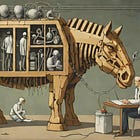The steep cost of socializing as an autistic
And how I learned to be OK with saying "no" when I need to
I’ve been a professional speaker for more than a decade now. I’ve delivered intimate 10-person workshops that last for hours and given keynotes on grand stages in front of thousands. Speaking has taken me all over the U.S. and around the world—to Spain, Germany, England, Sweden, Lithuania, Bulgaria, the Netherlands, and more. Several of the speakers I met along the way have become some of my closest friends and collaborators.
But people are often surprised to hear that I’m a speaker. After all, surely someone who loves standing in front of large groups of people wouldn’t also be introverted, anxious, and autistic.
And yet, here I am.
The truth is, I actually prefer being on stage to more informal social experiences.
When I’m presenting on stage, the roles are clear:
I am the teacher—the one who speaks
They are the learners—the ones who listen
I know what I’m there to do, and so does everyone else, and I know my material well enough to know that I can show up in service of the audience and deliver on the promise, helping them to create better content and better organize their creative processes.
During a presentation, expectations are also really clearly defined:
We start at a specified time, and we end at a specified time.
My voice will be the loudest because it’s supposed to be.
I don’t have to figure out when it’s my turn to speak, or decode when my contributions are welcome, or worry that I’ve offended someone by chiming in.
Clear non-verbal queues will indicate satisfaction and engagement level:
Positive: nods, smiles, taking pictures, writing notes, clapping…
Negative: furrowed brows, shaking heads, attention shifting toward phones…
Audible queues come at predictable times:
Laughter after a joke
Clapping after the introduction
Clapping at the end
Answers to questions I pose
When I’m all done, I’ll usually be emailed direct feedback—both quantitative and qualitative—that I can consume and process privately, when I’m in the right mindset, on my own time. In those responses, I’ll find specific information about what worked well, what didn’t, and how to improve next time.
This kind of situation is a dream for my autistic mind, to be honest: Clear roles, defined expectations, and direct feedback.
But 1:1 or small group conversations have none of those things. And that makes them wayyy harder for me.
This past week, I spoke at a conference in Pennsylvania. It was a double-header: I gave a 75-minute keynote, chatted with attendees for a bit, and then led a 60-minute breakout session later that afternoon.
I got to talk about the things I love, for an extended period, to an audience of people listening intently. (Maybe speaking is just structured info-dumping??) And when I was done, I fielded interesting questions that made me think in new ways, and I received generous compliments about the value I had provided simply by being there.
It was ✨autistic bliss✨
And you know what else?
It wore me the heck out.
After my sessions, when others were making plans to meet up downtown for drinks or dinner, I made my way through the labyrinthian convention center and back to my quiet lonely hotel room.
I changed into the softest pajamas, ordered dinner, and didn’t speak to another soul for the rest of the night. (Even the food delivery was no contact.)
And that was ALSO ✨autistic bliss✨
For many autistics, the social and sensory demands of events like these don’t just cause momentary exhaustion. They leave us with a kind of emotional hangover that can linger longgg after the vendors have packed up their backdrops and catering has cleared out the coffee.
Even when everything goes well, the emotional cost of getting there, getting ready, showing up, mingling with strangers, navigating unfamiliar environments, interpreting social cues, managing small talk, and filtering the symphony of sensory input is steep.
And, steep as that cost is, it’s often invisible to those around us.
Before I understood this about myself, any time I’d skip the social extracurriculars I’d spend that time berating myself for not taking full advantage of the event instead.
I’d tell myself I was a bad business owner because I was leaving the networking happy hour early, opting out of the themed lunch table discussions, and not packing every refreshment break with Very Important Business meetings.
I must be lazy, I thought. Everyone else is hustling to maximize their event experience, meanwhile, I was pretending I had a Very Important Zoom meeting just so I could go back to my hotel room.
I’d tell myself that I was being ungrateful by not accepting the invitations to dinner on a boat, then the karaoke party for event VIPs, and then the sponsored costume party at a dance club. And the 5 a.m. run club. And 6 a.m. yoga.
When I saw the photos the next day of everyone having fun eating and boating and singing and dancing and jogging and downward dogging, I rarely experienced FOMO, but I was swimming in guilt. I was left with a lingering sense that something was wrong with me because I didn’t even want to be socializing.
Even when I did force myself to attend these things, I never brought in new business during the Costumed Boat Yoga Happy Hour Extravaganzas anyway.
Instead, whenever I found myself at a CBYHHE, I’d be overwhelmed, overstimulated, nodding along to conversations I couldn’t process or participate in because of the overlapping sounds, and looking for snacks so I had something—ANYTHING—to do with my hands.
When I made it back to my room after a CBYHHE, I wasn’t sending follow-up emails or connecting with new prospects on Linkedin. I was lying motionless on the bed, staring blankly at the ceiling, replaying every fractured conversation, ruminating on how poorly I introduced myself, and regretting having gone in the first place.
I’ve come to realize that the CBYHHE was never where I was going to shine brightest.
The best way for ME to make the most of the event isn’t to force myself into overstimulating environments to keep up appearances. If I want an event to yield new business, then I need to kill it on stage—to bring my full energy and presence to the sessions where I’m sharing my work.
And the best way to do that, is to ruthlessly prioritize and protect my peace in the in-between moments, and especially afterward. It means conserving energy for travel, which is draining enough on its own, and making sure I have enough in the tank for the next session, the next audience, and the next flight home.
I don’t force myself to show up in ways that deplete me as often these days. I try plan for the recovery as much as I plan for the presentation. I bring my noise-canceling headphones, opt for comfy clothes and shoes, and bring along familiar snacks. I block out time and take only the most necessary and immovable calls while I’m traveling, trying to protect every moment of peace I can.
And this time of year, that’s especially important; I started writing this post in Pennsylvania on Friday, and I’m finishing it in Tampa, three days and three planes later.
I don’t mind the busy season, though. The truth is, I really DO enjoy being around people—I genuinely love connecting, exchanging ideas, and sharing stories, and I LOVE being able to help others and have a positive impact on their work.
But I’ve learned that I can love something AND still need to retreat from it to recharge.
This week, I needed those breaks, and I’m better off for having taken them.













![[Resources] So, you think you might be autistic?](https://substackcdn.com/image/fetch/w_140,h_140,c_fill,f_auto,q_auto:good,fl_progressive:steep,g_auto/https%3A%2F%2Fsubstack-post-media.s3.amazonaws.com%2Fpublic%2Fimages%2Fa0463ffc-e089-4920-b0b5-96c7b79f07b9_800x512)
Gawd, relating to this *so hard.*
Totally makes sense why I never had fears/issues with public speaking but struggle with informal interactions!